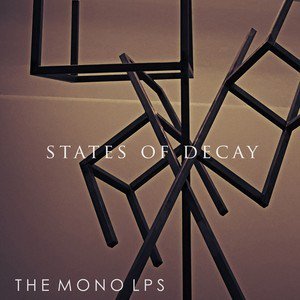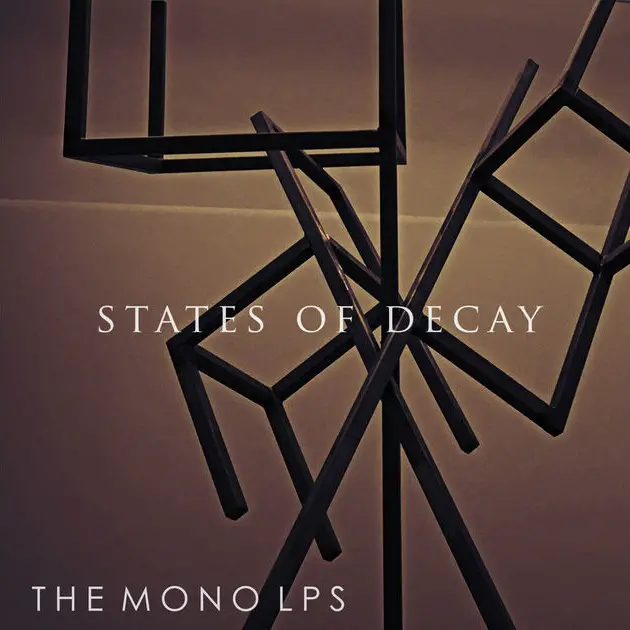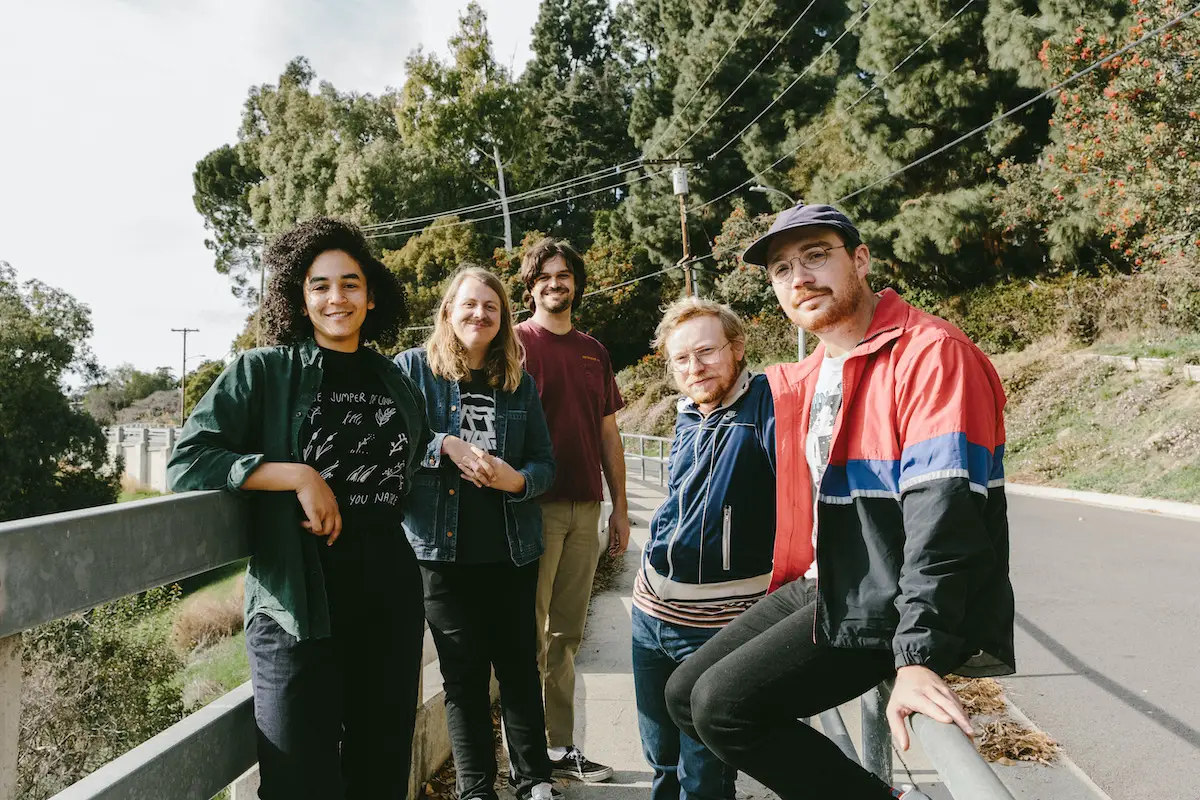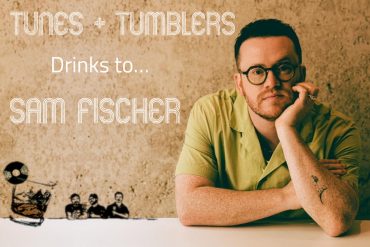There’s a distinct sound when it comes to British Rock and Roll. Think along the lines of Arctic Monkeys, The Beatles or The Kooks. They’ve all got a dark passion filled with a fierce adrenaline. But what do you get when you add classic influences, like a cello, to the mix? You get The Mono LPs: A beautifully crafted rock band with a twist.
Since breaking onto the scene in 2012 with the release of “Die A Little Death,” The Mono LPs, made up of Ste Reid, Vicky Mutch, Chris Barlow and Daniel Beech, have spent their time designing an original take on a popular sound. With the release of their debut album States of Decay, they’ve proven that classic can update any sound.

It would be simple for a listener to group the band with those of their kind, but upon deep listening, it becomes natural to categorize the band as their own instrumental powerhouse. Every track has an intricately crafted acoustic cello detail, adding a soft, yet forceful, constant holding each song together. Add that to the complimenting female vocals by Vicky, a sound not usually found in hard rock music, and the band is an experimental force unlike any other in the genre.
The majority of The Mono LPs’ tracks focus on sultry sounds and lyrics. The heavy instrumentals are not balanced by vocals, but rather embraced to create a musical tunnel of dark noise, pulling listeners deeper in each moment of alluring depth.
Watch: “Die A Little Death” – The Mono LPs
[youtube=https://youtu.be/663mQEPVgak?t=0s]“Cherry Red Lips” the second track on States of Decay, is influential in defining the band’s signature sound. Words speak of a beautiful woman and her need for independence. The song, not purely innocent in content, carries a heavy, seductive sound. “Cherry Red Lips” is followed by tracks that relate in content, speaking of things from a woman’s legs to love, or a lack thereof. Much of the messages revolve around lusting an emotional romantic encounter. Though context varies throughout the album, the one thing that stays remotely level is the intensity and mystery created by the band’s vigorous instrumentals. Listeners will feel the album pulling them deeper into a dark paradise, with small moments of serenity found in the intro and interlude, (States of Decay and States of Decay Part Two,) as well as in the last track “The Work Song.”
While intensity and a passionate, full-forced collection may define the band, “The Work Song” shows another side: a more vulnerable, stripped down side the band hasn’t been afraid to show. The track, which opens acoustically, embraces the cello that makes the band so unique, and shows the group’s pure talent and creativity in a new light.
Their ability to embrace an acoustic track shows the band is anything but a one trick pony, but rather a strategically created force. The Mono LPs’ SoundCloud page shows this side even better than “The Work Song,” as copies of the band’s original tunes, including “Emilia” and “Die A Little Death,” are stripped down and recorded acoustically. The variety in these tracks, compared to their originals, shows just how much raw passion is written into, and performed in each, regardless of production design or setting.
These moments of impulsive creativity are reminiscent of their self-designed image, one embracing their rock and roll sound, but never succumbing to a phony portrayal. The Mono LPs are not trying to be anything but themselves. They’ve got some big-name influences, like another little band from Liverpool called The Beatles, but stay completely individual from these inspirations by allowing their personality to shine in both musical decisions and artistic aesthetic. Any viewer can see this honest personality in the band’s music videos, designed with whimsical humor. In “Die A Little Death,” viewers watch the band continue to play their track as one by one, they are being kidnapped and dragged off set.
It’s all of these elements that set the band apart from competitors and will allow them to create a name for themselves among a plethora of up and coming rock bands. Atwood Magazine spoke with The Mono LPs about their classical influences, becoming a band in Liverpool and their sense of humor.

A CONVERSATION WITH THE MONO LPS
Atwood Magazine: You describe your music as “rock and roll with a cello.” Has that always been The Mono LPs’ descriptor or has your self-image developed over time?
We’ve always been rock and roll with a cello at the forefront. Due to Ste and Vicky meeting in music college, rocky guitar-like cello parts were one of the first elements of our sound that we created. However, our style has developed over time. We started off as a very ‘60s influenced band with mostly light and upbeat songs. When Chris and Dan joined, our style became heavier and darker.
Before you met and formed The Mono LPs, were your individual music styles similar to the sound you’ve found as a group?
The Mono LPs: Individually, we have quite different tastes but also influences that cross over. There is a mixture of heavy rhythms from Dan and Chris, with melodic and poetic lines from Ste’s writing, and the classical rock clash from Vicky’s cello.
I read that, Ste, you experimented with writing cello parts when you first met Vicky. How, if in any way, did writing for an instrument you don’t play, influence the way you write music?
Vicky: When Ste wrote the very first part for the cello, he wrote it as if he was writing a riff for an electric guitar. When I saw the part, I laughed because I had never seen cello music like that before and expected it to sound awful! But, when we played it along with the guitar and his vocals, I was really surprised as it worked perfectly in such a unique way.
Ste: When I write parts, I don’t really think about instruments, particularly. I think more so about how the parts connect together as ingredients of the song. I only think of the instrument later, in terms of which instrument the parts would sound better on. But I don’t initially think “I’m going to write for this instrument”. I do it the other way around.
What was it about mono LPs that inspired your band name?
Ste: Vicky’s dad was a DJ in the ‘70s and has a huge vinyl collection. I was having a browse through it one day and noticed that all the records used to say ‘mono LP’ or ‘monophonic’ on them. When I saw it, I thought it sounds like a cool band name and it fitted our sound at the time. Everyone seemed to like the name so it stuck!
Liverpool is littered with music history. What is your relationship to your hometown? Is it an inspiration?
Ste: It is amazing the number of musicians that are in Liverpool. It has a rich musical history but also currently, there are so many musicians. You can’t help but be inspired by great musicians from our city. The music industry is tougher than ever and it certainly helps to keep your motivation up, seeing so many great bands succeeding.
Who are some of your musical inspirations?
Vicky: I was brought up listening to The Beatles and Stevie Wonder, mainly, but also was lucky enough to have cello lessons so learnt classical music, too. Ste was also brought up on The Beatles, and his dad was a musician in the ‘60s and played alongside them so that was a huge inspiration to him. Chris and Dan are inspired by more metal and funk bands such as Red Hot Chili Peppers and Foo Fighters. But Dan and I have soul in common. We are always on the look out for new bands who influence our sounds. We particularly like bands who are heavily riff-driven like the Black Keys and Royal Blood.
There are definite traces of bands like The Beatles and Arctic Monkeys in your sound and musical styling, but you make a familiar style sound unique. How do you do this and how important is individuality to you?
Ste: I see music as a tree with the same roots but different branches shooting off it. So, you’ll always hear what’s gone before in the music, even if it’s only subtle. Everyone is trying to re-invent the wheel but trying to improve it with every generation. Without influences as growing up as a child, you can’t learn how to play an instrument or write a song. Imitation is the way that you learn. Paul McCartney used to impersonate Elvis and Little Richard which eventually became part of his vocal style. But, of course, he brings his own individuality and other influences to the table.
Your music videos are created with a large amount of personality and humor. Why have you chosen to lace humor into your work?
Ste: We’re not snobs about our art. Comedy is just a legitimate art form as anything else. It’s the media that has lessened its impact on society as an artform. We’re from Liverpool, which is considered to be a city with a great sense of humour, so that was always going to be part of our “thing”. Plus, these days with the Internet and YouTube, you’ve got to grab people’s attention more so than ever and comedy is the best way to do it.
Watch: “L.O.V.E. & H.A.T.E.” – The Mono LPs
[youtube=https://youtu.be/h-0-rtudDM0?t=0s]
You released your first single, “6 AM,” five years ago. What are you most proud of about your musical development between then and now?
Ste: We’ve become better musicians and more confident performers. When we recorded 6am, we thought we knew everything but we have learnt so much since and are still learning. We now know we can always get better.
Vicky: When we first started out, we had a favourite song of ours called “Losing Myself”. We used to finish all our gigs with it and thought we would never have a song better than it. But, with time, we wrote better songs and soon “Losing Myself” was pushed out the set to be replaced with newer, more exciting songs. When we released “Die A Little Death” a few years ago, we thought that was the best and it would never be topped, but sure enough it was and “Die A Little Death” isn’t even featured on the album! It is exciting to think that we will continue to write songs that are better and better and our sound and style will keep developing.
Your debut album States of Decay is now available. What made you wait so long to release a full collection?
Ste: We have always wanted to release an album but we never really had a plan for it. But after we recorded “Emilia”, we had some more studio time to record a few songs for an EP. This expanded and we eventually had an album’s worth. Also, lots of people had asked us over the years when our album will be out. We decided that we should do it sooner rather than later.
For each heavy instrumental song you release there exists an acoustic counterpart. What is it that you like so much about acoustic versions?
Vicky: The cello was made to be played acoustically. I love playing cello in a rock band, using a pick-up to amplify my sound so that it’s competing with the electric guitars and Dan’s loud drum kit. I think it sounds unique. However, I also love the opportunity to play the cello acoustically so that its voice can be heard properly and more “musically”, in a way. It gives it a completely different feel. Often, when people have watched us play an acoustic gig, people have asked us if we’ve changed the cello parts as they have never noticed some of the melodies and riffs that I play, but the parts are the same as always. They can just hear it clearer and in a different setting.
Do you write new songs with acoustic versions in mind?
Ste: No, not really. All the songs start out being written on an acoustic guitar or piano and then it’s really how far we take them as a band that decides whether they become acoustic or electric. You can just tell when you start working on them as a band if they’re going to work. Some songs don’t work acoustically at all, and vice versa.
“Emilia,” a single you released in 2014, was inspired simply because you met a woman named Emilia and felt her name would sound good in a song. Do you tend to draw lyrical inspiration from everyday encounters?
Ste: Yeah. All songs are personal. Whether the story is imagined or real, it’s all about personal experiences that you draw on as a songwriter. The content can be manipulated for poetic license but there’s always a realness there. Songs don’t work without a realness and universal truth in them. A 2 minute pop song with superficial lyrics isn’t going to last long. It’s always best to draw on something that people can relate to in their own lives. I was inspired by songs such as The Kinks “Victoria”, The Beatles “Eleanor Rigby” and The Zutons “Valerie” so I wanted to find a name that would sound good in a song. Luckily, we have a Swedish friend called Emilia who helps run the Threshold Festival in Liverpool and I liked the unusual spelling of the name, so that’s how it started. Musically, the song was based around Bowie and James Brown.
What can listeners expect from you in the upcoming months?
Ste: We’ve started writing our next album, but it won’t be out in the next few months. We’ll have our first tour planned for next year to promote States of Decay and then we’ll focus on new material.
— — — —
Connect with The Mono LPs on Facebook, Twitter, Instagram
Discover more new music on Atwood’s Picks
cover photo: The Mono LPs © 2016










